20:30 The conference session is now closed. Thanks for following Ahram Online's coverage.
19:45 The international industrial and logistics centre will stretch across the three governorates of Port Said, Ismailia, and Suez and include six sea ports, says Yehia Zaki, managing director of Dar Al-Handasah Egypt, who is presenting details of the mega-project to the conference.
The project will require $15 billion to be spent on utilities, as well as 6 gigawatts of power, and will include three economic zones covering an area of 500 square kilometres as follows:
The East Port Said zone which will house a transshipment port and an industrial area of 40 square kilometres for light and medium industries. Crucially, it will include the new East Suez Port, the first phase of which has been completed.
The Qantara zone which will house food industries because of its proximity to agricultural land, SMEs, textiles industry, and housing and real estate.
The Ain Al-Sokhna zone which encompasses 80 square kilometres in north west Suez, and include a port which will act as Egypt’s gate to the GCC, connecting the Gulf with Africa and Asia. It will also include medium and heavy industries.
The Suez Canal Authority will invest in the Suez Canal Zone industrial and logistics hub, says Moheb Mamish, head of the authority.
Egypt will establish an authority to oversee the Suez Canal Zone on behalf of the state, to be regulated by the recently amended law for special economic zones.
The new body will be in charge of land allocation in the zone, act as a one-stop shop for investors in the zone’s projects, and will issue permits on behalf of the state, excluding permits related to the defence ministry or the justice system.
19:30 Moheb Mamish, the head of the Suez Canal Authority, addressed the conference.
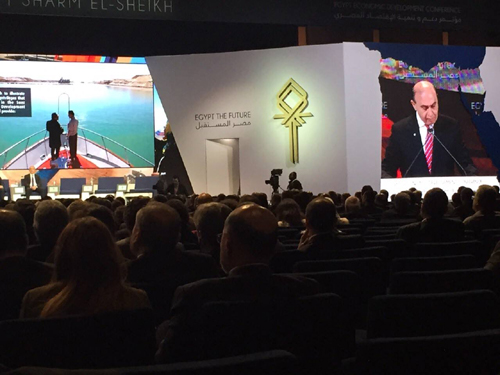
Suez canal authority head Mohab Mamish (AO)
19:15 Egyptian real estate developer Palm Hills and Emirati investment company Aabar have signed a $19.7 billion MOU with Egypt’s Ministry of Housing to implement a real estate project in the vicinity of 6 October city, a satellite development just outside Cairo. The project includes the construction of a new city.
Egypt’s housing minister said he expects the return on investment of the project to reach 25 to 30 percent.
19:10 The Suez Canal Development Project will constitute 30 to 35 percent of Egypt’s economy once completed, says the presenter at the Suez panel. The speakers are expected to unveil final details of the mega-project. President El-Sisi is in the audience.
18:50 The World Bank has allocated $5 billion for its Egypt programme over the next four years, says Hafez Ghanem, the Bank’s MENA Vice President. It will therefore increase its annual portfolio more than twofold to $1.2 billion.
The Bank's portfolio in Egypt focuses on job creation through the private sector, and on social services, says Ghanem.
18:45 The European Investment Bank has two billion euros of investments in the pipeline for Egypt, says VP Ambroise Fayolle.
18:30 "Infrastructure is critical, particularly energy,” says Jin-Yong Cai, Senior Vice President and CEO of the World Bank Group’s International Finance Corporation. It’s not possible to build it all with foreign capital, so Egypt must mobilise domestic capital to mitigate the risks of foreign financing, says Cai.
18:15 The main difference between Egypt’s growth plans before the 2011 uprising and now is that there is now a clear economic orientation towards reliance on the private sector, says CIB's Hisham Ezz Al-Arab.
18:00 American private equity firm Ripplewood Holdings will announce investments in Egypt’s real estate sector during the conference, says CEO Timothy Collins.
The firm hopes to find an opportunity to invest in the financial services sector, said Collins, adding that the firm’s investment in Egypt’s largest private lender, CIB, had been very encouraging and calling CIB “a world-class financial institution.”
Collins also expressed an interest in Egypt’s agricultural sector.
17:45 “The big challenge will be getting everyone to work all in harmony,” says CIB Chairman and Managing Director Hisham Ezz Al-Arab, who is speaking during the investment opportunities session. He stresses the need for enlisting the Egyptian public in Egypt’s economic takeoff.
17:30 “Egypt is on the edge of an investment super highway, if it gets things right,” says Arif Naqvi, Group Chief Executive of Abraaj Group in a panel discussion about investment opportunities in Egypt.
Egypt needs a lot of capital very quickly and a private sector that is ready to invest, not just a reformist government and aid from foreign governments, says Naqvi.
17:15 Renowned Egyptian economist Mohamed El-Erian praised the economic conference via Twitter.
“A huge thank you to all who have worked so hard, and are working so hard to make #EEDC such a great success. Superb job,” he wrote.
17:00 Conference attendees have a taste of strawberries at a conference coffee break.
16:50 Minister of Trade and Industry Mounir Fakhry Abdel-Nour tells Ahram Online at the conference that Western countries felt threatened by the lack of stability in Egypt but have now been convinced to take part Egypt’s development.
“We are waiting to see the degree of their commitment,” he said.
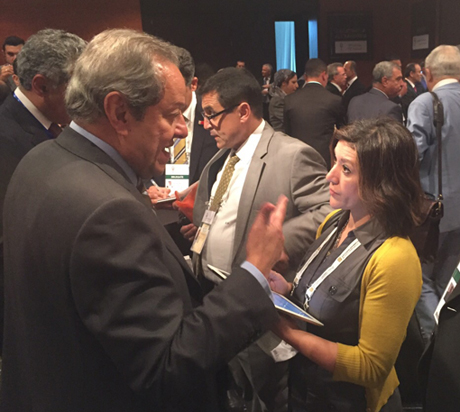
Minster Mounir Fakhry Abdel-Nour speaks to Ahram Online's Salma Hussein
16:45 Egypt has signed four agreements with the Islamic Development Bank (IDB) worth a total of $800 million to finance four priority development projects for Egypt, according to a government press statement.
The projects include an Egyptian-Saudi Electricity Connection project with lease financing of $220 million, the Sharm El-Sheikh Airport Development project with a first tranche of lease financing of $226.8 million and a second tranche of $230.2 million, and lease financing for "Assiut Refinery" of $198 million.
A framework agreement worth around $3 billion was signed between the International Islamic Trade Finance Corporation (an affiliate of the IDB Group) and the Egyptian General Petroleum Corporation (EGPC) to import petroleum products for the Egyptian market over the next three years.
15:50 British energy company BG will invest $4 billion in Egypt over the next two years, Reuters reports.
The company will sign an agreement with Egypt on the final day of the conference, said BG Chief Operating Officer Sami Iskander.
15:45 The UAE’s Al Swidan Group signed two deals worth a total of $6 billion with Egypt to invest in the grain logistic hub in Damietta in Egypt’s Delta as well as in the Suez Canal Development Project.
Minister of Supply Khaled Hanafi said that the UAE’s Al Ghurair group has expressed its intention to acquire a third of the storage capacity in the grain hub, Reuters reports. Indian companies have also shown interest in the project intended to be a regional hub to store, trade and process grain.
15:35 Speaking in plenary, the CEO of Etisalat group, Ahmad Abdulkarim Julfar, says that Egypt needs to develop its broadband capacity, to provide its citizens with faster broadband service.
Every Egyptian is entitled to broadband speeds of 21MB and over, he adds.
Etisalat’s Egypt arm is one of three existing mobile operators in the country.
15:30 Ahram Online's reporter on the field tells us that five simultaneous panel sessions are taking place with Egyptian ministers and influential investors.
The topics of the sessions are:
1.Oil gas and mining
2.Housing, utilities and development
3.Information and communication technology
4.Industry and Manufacturing
5.Tourism
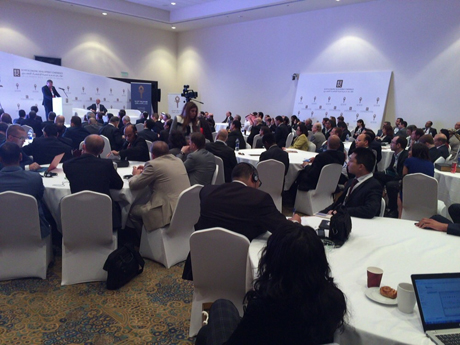
The IT session (Photo: Fouad Mansour)
15:20 The Egyptian General Petroleum Corporation signed an agreement worth around $3 billion with the International Islamic Trade Finance Corporation (an affiliate of the IDB Group) to import petroleum products for the Egyptian market over the next three years.
15:10 If you're looking for even closer coverage of the conference, you can check out the livestream here.
15:00 Still to come after the lunch break are plenary sessions on the diversification of the Egyptian economy, the prospects for investment in Egypt, the role of international financial institutions in supporting Egypt's development, and then finally this evening the highly anticipated session giving details about the Suez Canal megaprojects.
14:20 Egypt and Cyprus signed a memorandum of information exchange over the possible establishment of a natural gas pipeline extending from Cyprus’s Aphrodite field to Egypt, Egypt's Minister of Petroleum told Reuters. The study will be concluded by mid-2015.
Cyprus and Egypt agreed on November 2014 to accelerate talks on the potential export of Cypriot gas to Egypt.
14:10 Egypt will establish an independent regulator for the oil and gas sector “in six months or more” says the Minister of Petroleum Sherif Ismail.
14:00 The recently issued electricity law, which liberalises electricity production and transmission is a “huge milestone,” construction and fertilisers tycoon Nassef Sawiris tells one of the conference's side panels.
Sawiris’s Orascom Construction plans to build a $2.5 billion to $3 billion coal-fired power station on the Red Sea coast in partnership with Emirati-based International Petroleum Investment Company (IPIC).
13:55 BP CEO Bob Dudley says his company was encouraged to make today’s $12 billion investment in Egypt after seeing what he described as the “cutting of red tape” over the past couple of months.
“We have gone through complex agreements, we believe we are secure… the flexibility, the attitude from many partners and government have been outstanding,” he said calling it a sign of change in business environment in Egypt.
Gas production from the $12 billion deal signed today will start in 2017, said Dudley.
13:50 Earlier today, there were a couple of big deals announced. Egypt signed an MOU with ACWA Power International of Saudi Arabia and Masdar of UAE to construct a number of power plants, including solar plants and a wind plant. The total investment will be $2.4 billion and the power plants will have a total production capacity of up to 4,400 megawatts.
In addition, Egypt signed a second MOU with ACWA Power International for the construction of a coal power plant. Investments total $7 billion and the production capacity will be 4,000 megawatts. The memorandums were signed in the presence of Ibrahim Al-Assaf, Saudi finance minister and Sultan Al-Jaber, UAE minister of state.
Siemens International and Egypt's Ministry of Electricity and Renewable Energy also signed four MOUs worth $10 billion to construct several conventional power plants with a total production capacity of 6,600 megawatts, as well as a factory to produce equipment for wind energy farms and transformers, Reuters reports.
13:40 There is a lot happening, says Ahram Online's reporter in Sharm. As well as speakers in the main hall, there are several other side events happening simultaneously, along with press conferences and closed meetings between key figures.
Outside the main chamber, CEOs rub shoulders with ministers. Ahram Online caught up briefly with GE's vice president for healthcare in Africa, who said that he has been to lots of economic conferences but this is probably the highest attendance rate from multinationals and big businesses.
Another enthusiastic attendee is Britain's ambassador to Egypt, John Casson, who told Ahram Online that he was impressed by the positive atmosphere. He was also very pleased at BP's announcement of a new energy deal worth $12 billion, and he promises that there will be further announcements of British investments tomorrow.
13:30 President El-Sisi has just concluded a meeting with the French minister of finance, according to Ahram Online’s reporter on the field. There'll be a press conference shortly.
13:20 Ahram Online’s reporter on the scene says the atmosphere is hectic and the mood upbeat. Around 1,500 people crammed into the main hall to watch Blair speak, while hundreds more mill around outside the chamber, networking, chatting, and swamping the booths set up by the sponsors of the event. The media have been allowed into the event and camera crews are everywhere.
Organisers told our reporter that they were originally expecting around 1,700 attendees, but the final number is around 3,500, and they had to stuff extra lines of chairs into the main hall to accomodate everyone.
13:10 Former British prime minister Tony Blair has been speaking in the main room at the conference. He praised a number of recent decisions taken by the Egyptian government saying they have had a positive short term impact. He cited the new investment law, reforms on fuel subsidies, and the promotion of the private sector as examples of positive reforms.
But Egypt must also establish an open-minded and tolerant education system and empower women in the workforce, argues Blair.
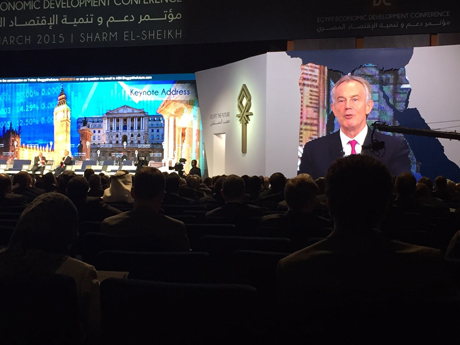
Tony Blair speaks at the conference (Photo: Fouad Mansour)
13:00 Egypt will take legal steps to liberalise both the healthcare sector and the mining sector, Investment Minister Ashraf Salman announces at the panel where he is speaking. “The government and the country is committed to liberalising different sectors.” Egypt has recently passed a law opening up the electricity sector to private investors.
12:50 A video introducing the Egyptian government’s Sustainable Development Strategy 2030 was screened on Saturday at the Sharm El-Sheikh conference.
Missed the video? You can watch it here.
12:40 We need to fight bureaucracy and we also need to amend laws regulating business, particularly in relation to SMEs, argues telecoms tycoon Naguib Sawiris. He's speaking at a conference panel.
Ashraf Salman, the investment minister, is speaking at the same panel. He says some of the main challenges facing SMEs in Egypt are governance, documentation, and ratification of financial figures. He says the government established the Bedaya Fund to support SMEs.
12:30 Egypt needs a new law to protect citizens from governmental mistakes, argues Egyptian billionaire Naguib Sawiris. Sawiris, speaking during a panel at the conference, accuses some members of the current government of being “conservative” and “uncreative”.
12:20 Egypt has just signed an energy deal with British Petroleum worth $12 billion over four years, reportedly the biggest single foreign investment in Egypt's history.
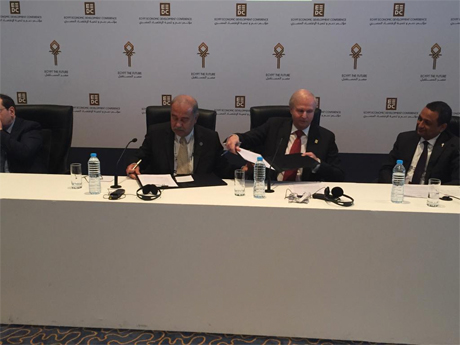
BP CEO Bob Dudley (2nd from R) signs with Egypt's Petroleum Minster Sherif Ismail (L) a $12 billion investment deal, the biggest in Egypt's history during Egypt's Economic Development Conference in Sharm el-Sheikh, Egypt, Saturday, March 14, 2015 (Photo: Fouad Mansour)
12:10 President El-Sisi and Dubai's leader Sheikh Mohammed bin Rashed Al-Maktoum have just witnessed the contract signing for the project that will create Egypt's new capital city. You can watch a video giving details about the new administrative capital here.
12:00 The second day of Egypt's Economic Development Conference has begun with the government revealing details of its economic vision for Egypt to 2030.
Prime Minister Ibrahim Mahlab delivered an address followed by cabinet heads.
The first day of the conference, Friday, saw Kuwait, Saudi Arabia, the UAE and Oman pledge $12.5 billion in aid to Cairo, in addition to a declaration of support by international leaders for Egypt in its war against terrorism.
Follow us while Ahram Online brings you live coverage of the second day of the Sharm El-Sheikh conference.
Short link: